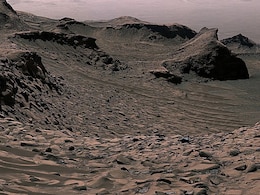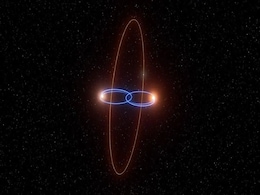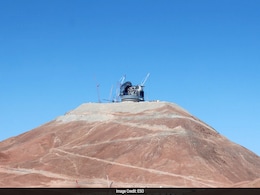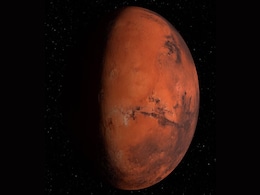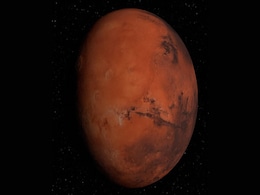New Planet
- All
- News
- Videos
-

Neighbouring Planets To Faraway Galaxies, NASA Shares Stunning Pics To Celebrate Hubble Telescope's 35th Anniversary
- Thursday April 24, 2025
- Science | Edited by Bhavya Sukheja
To mark the 35th anniversary of the Hubble Space Telescope, the US space agency NASA released new high-definition photos taken with the technological marvel.
-
 www.ndtv.com
www.ndtv.com
-

New Research Suggests Possible Signs Of Life On Exoplanet K2-18b
- Monday April 21, 2025
- World News | Ian Whittaker, The Conversation
What do you think of when it comes to extra terrestrial life? Most popular sci-fi books and TV shows suggest humanoid beings could live on other planets
-
 www.ndtv.com
www.ndtv.com
-

NASA Curiosity Rover Potentially Deciphers Mars’ Missing Carbonate Mystery
- Friday April 18, 2025
- Written by Gadgets 360 Staff
NASA’s Curiosity rover potentially ended the mystery of the ancient atmosphere and missing carbonates. The research uncovers the potential reasons behind the temperature of the planet Mars and how it has supported the liquid water on the planet. Explore the findings and the discoveries made by NASA’s Curiosity rover.
-
 www.gadgets360.com
www.gadgets360.com
-

NASA Rover Finds New Evidence Of Warm, Wet Past Of Mars
- Thursday April 17, 2025
- World News | Reuters
A mineral called siderite found abundantly in rock drilled by a NASA rover on the surface of Mars is providing fresh evidence of the planet's warmer and wetter ancient past when it boasted substantial bodies of water and potentially harboured life.
-
 www.ndtv.com
www.ndtv.com
-

Bizzare 'Failed Star' Planet Orbiting Double Star System in Milky Way Discovered by Researchers
- Thursday April 17, 2025
- Written by Gadgets 360 Staff
Astronomers have discovered an exoplanet 90 degrees tilted around a special pair of eclipsing brown dwarfs. This uncommon "polar planet" challenges accepted wisdom on planet creation by presenting new insights on the dynamics of binary stars and the range of Milky Way planetary orbits.
-
 www.gadgets360.com
www.gadgets360.com
-

Astronomers Detect Methane in the Atmosphere of the Nearest T Dwarf Star to Earth
- Saturday April 12, 2025
- Written by Gadgets 360 Staff
Astronomers have detected methane in the nearest known T dwarf, offering new insight into its atmospheric composition. The study further highlights that the carbon abundance in the planet is estimated to be -1.5 dex, while the effective temperature could be around 1,000 K. The author of the paper further revealed that the low metallicity of the T ...
-
 www.gadgets360.com
www.gadgets360.com
-

This New Telescope Can Negate 'False-Positives' Of Alien Life Within Hours
- Friday April 4, 2025
- Science | Edited by Abhinav Singh
The ELT could identify biosignatures on planets in our solar system as well as orbiting Proxima Centauri within hours.
-
 www.ndtv.com
www.ndtv.com
-

New Study Reveals Chemical Secret Of Earth's 4.5 Years Billion Crust
- Thursday April 3, 2025
- Science | Simon Turner, The Conversation
Earth is the only known planet which has plate tectonics today. The constant movement of these giant slabs of rock over the planet's magma creates continents - and may have even helped create life.
-
 www.ndtv.com
www.ndtv.com
-

Two New Exoplanets Found Orbiting a Star in Draco Constellation
- Wednesday April 2, 2025
- Written by Gadgets 360 Staff
Astronomers have identified two exoplanets, TOI-1453 b and TOI-1453 c, orbiting a star 250 light-years away in Draco. The planets, a super-Earth and a sub-Neptune, were detected using NASA’s TESS satellite and the HARPS-N spectrograph. TOI-1453 b is a rocky planet orbiting close to its star, while TOI-1453 c is twice Earth’s size and may have a...
-
 www.gadgets360.com
www.gadgets360.com
-

New Study Challenges Claims of Vast Underground Water on Mars
- Thursday March 27, 2025
- Written by Gadgets 360 Staff
Mars’ water history remains a mystery as new research questions the claim that vast amounts of water are stored beneath its surface. A study led by Bruce Jakosky argues that previous estimates of Mars’ mid-crust being saturated with liquid water may be inaccurate. The findings challenge earlier interpretations of seismic data from NASA’s InSi...
-
 www.gadgets360.com
www.gadgets360.com
-

Alien Life May Survive on Planets Orbiting White Dwarfs, Study Finds
- Wednesday March 26, 2025
- Written by Gadgets 360 Staff
New research explores the possibility of alien life on planets orbiting white dwarfs. While these stellar remnants cool over time, their shrinking habitable zones may still allow biological processes like photosynthesis and UV-driven abiogenesis to occur. A model assessing a planet's energy reception over seven billion years indicates that life-sus...
-
 www.gadgets360.com
www.gadgets360.com
-

4 Planets Found Orbiting Earth's Nearest Star. They Are Too Hot For Life
- Wednesday March 12, 2025
- World News | Asian News International
Astronomers have revealed new evidence that there are not just one but four tiny planets circling around Barnard's Star, the second-nearest star system to Earth.
-
 www.ndtv.com
www.ndtv.com
-

Mysterious Planetary-Mass Objects May Form in Young Star System Clashes
- Wednesday March 12, 2025
- Written by Gadgets 360 Staff
Recent research challenges traditional views on planetary-mass objects, suggesting they may form through violent interactions between young star systems rather than standard planetary or stellar processes. Simulations indicate these clashes create dense gas filaments that evolve into free-floating objects, often in binary pairs. This discovery expl...
-
 www.gadgets360.com
www.gadgets360.com
-

James Webb Space Telescope Observes Mysterious Rogue Planet-Like Object
- Thursday March 6, 2025
- Written by Gadgets 360 Staff
The James Webb Space Telescope has captured new insights into SIMP 0136, a planetary-mass object floating freely around 20 light-years away. This celestial body, possibly a rogue planet or a brown dwarf, has puzzled astronomers for years. JWST’s infrared observations have revealed intricate cloud layers, temperature shifts, and potential chemical...
-
 www.gadgets360.com
www.gadgets360.com
-

New Research Reveals Mars’ Red Colour Linked to Ancient Water Presence
- Monday March 3, 2025
- Written by Gadgets 360 Staff
A recent study suggests that Mars’ red hue originates from ferrihydrite, an iron oxide that forms in water-rich environments. Scientists recreated Martian dust in labs and found that the mineral remained stable despite the planet’s dry conditions. Data from orbiting spacecraft and rovers confirm this discovery, reshaping theories about Mars’ ...
-
 www.gadgets360.com
www.gadgets360.com
-

Neighbouring Planets To Faraway Galaxies, NASA Shares Stunning Pics To Celebrate Hubble Telescope's 35th Anniversary
- Thursday April 24, 2025
- Science | Edited by Bhavya Sukheja
To mark the 35th anniversary of the Hubble Space Telescope, the US space agency NASA released new high-definition photos taken with the technological marvel.
-
 www.ndtv.com
www.ndtv.com
-

New Research Suggests Possible Signs Of Life On Exoplanet K2-18b
- Monday April 21, 2025
- World News | Ian Whittaker, The Conversation
What do you think of when it comes to extra terrestrial life? Most popular sci-fi books and TV shows suggest humanoid beings could live on other planets
-
 www.ndtv.com
www.ndtv.com
-

NASA Curiosity Rover Potentially Deciphers Mars’ Missing Carbonate Mystery
- Friday April 18, 2025
- Written by Gadgets 360 Staff
NASA’s Curiosity rover potentially ended the mystery of the ancient atmosphere and missing carbonates. The research uncovers the potential reasons behind the temperature of the planet Mars and how it has supported the liquid water on the planet. Explore the findings and the discoveries made by NASA’s Curiosity rover.
-
 www.gadgets360.com
www.gadgets360.com
-

NASA Rover Finds New Evidence Of Warm, Wet Past Of Mars
- Thursday April 17, 2025
- World News | Reuters
A mineral called siderite found abundantly in rock drilled by a NASA rover on the surface of Mars is providing fresh evidence of the planet's warmer and wetter ancient past when it boasted substantial bodies of water and potentially harboured life.
-
 www.ndtv.com
www.ndtv.com
-

Bizzare 'Failed Star' Planet Orbiting Double Star System in Milky Way Discovered by Researchers
- Thursday April 17, 2025
- Written by Gadgets 360 Staff
Astronomers have discovered an exoplanet 90 degrees tilted around a special pair of eclipsing brown dwarfs. This uncommon "polar planet" challenges accepted wisdom on planet creation by presenting new insights on the dynamics of binary stars and the range of Milky Way planetary orbits.
-
 www.gadgets360.com
www.gadgets360.com
-

Astronomers Detect Methane in the Atmosphere of the Nearest T Dwarf Star to Earth
- Saturday April 12, 2025
- Written by Gadgets 360 Staff
Astronomers have detected methane in the nearest known T dwarf, offering new insight into its atmospheric composition. The study further highlights that the carbon abundance in the planet is estimated to be -1.5 dex, while the effective temperature could be around 1,000 K. The author of the paper further revealed that the low metallicity of the T ...
-
 www.gadgets360.com
www.gadgets360.com
-

This New Telescope Can Negate 'False-Positives' Of Alien Life Within Hours
- Friday April 4, 2025
- Science | Edited by Abhinav Singh
The ELT could identify biosignatures on planets in our solar system as well as orbiting Proxima Centauri within hours.
-
 www.ndtv.com
www.ndtv.com
-

New Study Reveals Chemical Secret Of Earth's 4.5 Years Billion Crust
- Thursday April 3, 2025
- Science | Simon Turner, The Conversation
Earth is the only known planet which has plate tectonics today. The constant movement of these giant slabs of rock over the planet's magma creates continents - and may have even helped create life.
-
 www.ndtv.com
www.ndtv.com
-

Two New Exoplanets Found Orbiting a Star in Draco Constellation
- Wednesday April 2, 2025
- Written by Gadgets 360 Staff
Astronomers have identified two exoplanets, TOI-1453 b and TOI-1453 c, orbiting a star 250 light-years away in Draco. The planets, a super-Earth and a sub-Neptune, were detected using NASA’s TESS satellite and the HARPS-N spectrograph. TOI-1453 b is a rocky planet orbiting close to its star, while TOI-1453 c is twice Earth’s size and may have a...
-
 www.gadgets360.com
www.gadgets360.com
-

New Study Challenges Claims of Vast Underground Water on Mars
- Thursday March 27, 2025
- Written by Gadgets 360 Staff
Mars’ water history remains a mystery as new research questions the claim that vast amounts of water are stored beneath its surface. A study led by Bruce Jakosky argues that previous estimates of Mars’ mid-crust being saturated with liquid water may be inaccurate. The findings challenge earlier interpretations of seismic data from NASA’s InSi...
-
 www.gadgets360.com
www.gadgets360.com
-

Alien Life May Survive on Planets Orbiting White Dwarfs, Study Finds
- Wednesday March 26, 2025
- Written by Gadgets 360 Staff
New research explores the possibility of alien life on planets orbiting white dwarfs. While these stellar remnants cool over time, their shrinking habitable zones may still allow biological processes like photosynthesis and UV-driven abiogenesis to occur. A model assessing a planet's energy reception over seven billion years indicates that life-sus...
-
 www.gadgets360.com
www.gadgets360.com
-

4 Planets Found Orbiting Earth's Nearest Star. They Are Too Hot For Life
- Wednesday March 12, 2025
- World News | Asian News International
Astronomers have revealed new evidence that there are not just one but four tiny planets circling around Barnard's Star, the second-nearest star system to Earth.
-
 www.ndtv.com
www.ndtv.com
-

Mysterious Planetary-Mass Objects May Form in Young Star System Clashes
- Wednesday March 12, 2025
- Written by Gadgets 360 Staff
Recent research challenges traditional views on planetary-mass objects, suggesting they may form through violent interactions between young star systems rather than standard planetary or stellar processes. Simulations indicate these clashes create dense gas filaments that evolve into free-floating objects, often in binary pairs. This discovery expl...
-
 www.gadgets360.com
www.gadgets360.com
-

James Webb Space Telescope Observes Mysterious Rogue Planet-Like Object
- Thursday March 6, 2025
- Written by Gadgets 360 Staff
The James Webb Space Telescope has captured new insights into SIMP 0136, a planetary-mass object floating freely around 20 light-years away. This celestial body, possibly a rogue planet or a brown dwarf, has puzzled astronomers for years. JWST’s infrared observations have revealed intricate cloud layers, temperature shifts, and potential chemical...
-
 www.gadgets360.com
www.gadgets360.com
-

New Research Reveals Mars’ Red Colour Linked to Ancient Water Presence
- Monday March 3, 2025
- Written by Gadgets 360 Staff
A recent study suggests that Mars’ red hue originates from ferrihydrite, an iron oxide that forms in water-rich environments. Scientists recreated Martian dust in labs and found that the mineral remained stable despite the planet’s dry conditions. Data from orbiting spacecraft and rovers confirm this discovery, reshaping theories about Mars’ ...
-
 www.gadgets360.com
www.gadgets360.com



